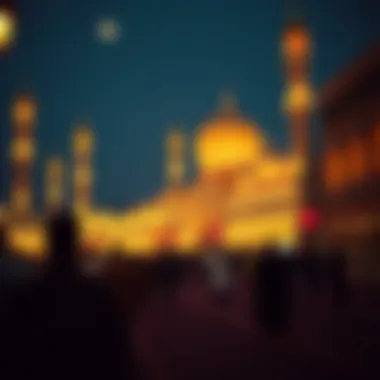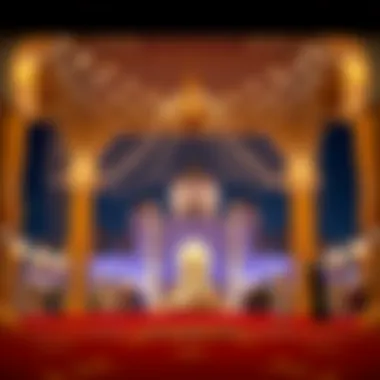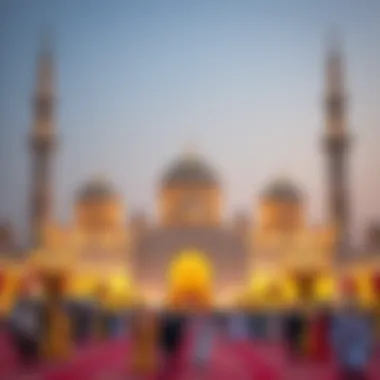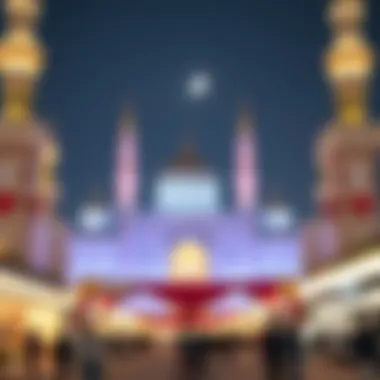Eid Holiday 2024 in Dubai: Significance and Celebrations


Intro
Eid al-Fitr, marking the end of Ramadan, is a significant festival for Muslims worldwide, celebrated with joy, gratitude, and community spirit. In Dubai, this occasion holds a special place, weaving together cultural traditions and modern extravagance. As the city gears up for the Eid Holiday 2024, residents and visitors alike look forward to a celebration that reflects both the rich heritage of the region and the contemporary dynamism that Dubai embodies.
As one of the most diverse cities globally, Dubai is home to a myriad of cultures that converge during Eid, creating a vibrant tapestry of festivities that appeal to every palate. Not only does the holiday symbolize the joy of togetherness, it also brings with it economic opportunities, particularly in tourism and real estate, impacting the market significantly in the lead-up to and following the event.
During this article, we will explore the various facets of Eid in Dubai for the year 2024. From understanding its deep-rooted significance to discussing the grand celebrations planned, we will then examine how this holiday influences the local economy, particularly focusing on market trends and property dynamics in the region. This holistic approach not only highlights the cultural richness of Eid but also underscores its importance within Dubai's bustling commercial landscape, providing insights for investors and residents alike.
Understanding Eid in Dubai
Eid holds a significant place in the cultural fabric of Dubai, intertwining spirituality, community engagement, and economic vitality. Understanding the nuances of this holiday provides deeper insight into its impact on both residents and visitors. As the festival approaches in 2024, it's essential to grasp not only the rites and traditions but also how these celebrations shape the local economy and community spirit.
Historical Context
Eid in Dubai is rooted in a rich historical narrative that reflects the region's Islamic heritage. The festival commemorates key religious events, primarily Eid al-Fitr and Eid al-Adha. Eid al-Fitr marks the end of Ramadan, while Eid al-Adha signifies the willingness of Prophet Ibrahim to sacrifice his son in obedience to God. These events foster unity and reflection among Muslims in the community.
Historically, these celebrations were marked by communal prayers, feasting, and acts of charity, and over the years, they've evolved into grand public events characterized by fireworks, concerts, and festivals.
Religious Significance
The essence of Eid goes beyond mere celebration; it is a profound expression of faith and devotion. The religious significance of Eid al-Fitr lies in gratitude toward Allah for the strength and discipline shown during Ramadan. Families come together to observe the morning prayers at mosques, connecting thousands in shared spirituality.
On the other hand, Eid al-Adha emphasizes sacrifice and altruism, symbolizing deeper ties to the faith. Those who can afford it perform the Qurbani, or act of slaughtering an animal, sharing parts with those in need. This practice cultivates a sense of brotherhood and compassion within the community.
Eid Traditions in the UAE
Eid traditions in the UAE exhibit a vibrant blend of local customs and Islamic practices. In the days leading up to Eid, families engage in thorough preparations—decorating homes and shopping for new clothes. The morning of Eid typically begins with a hearty breakfast, followed by communal prayers at mosques.
Social gatherings take center stage, fostering connections among friends and relatives. One common practice is the exchange of Eidiyah, a form of gift, usually given to children, fostering joy during the festivities.
Dubai's cosmopolitan nature brings an array of, forms of celebrations, fusing traditional Emirati customs with global influences. Street festivals feature cultural performances, food stalls, and local artisans showcasing their craftsmanship, promoting a sense of cultural exchange.
All these elements together create a vibrant tapestry that signifies the spirit of Eid in Dubai, making it a pivotal period for social interaction and reflection when the community comes together in shared values.
Eid Holiday Dates for
Understanding the specific dates for the Eid holidays in 2024 is crucial for various reasons. Not only does it provide insight into when the celebrations will take place, but it also helps in planning activities, travel, and even key economic considerations for both residents and visitors. Considering the significance of Eid, which marks important moments in the Islamic calendar, knowing these dates can foster a deeper appreciation and participation in local traditions and festivities.
Eid al-Fitr
Eid al-Fitr in 2024 is expected to be observed on the 10th of April, although the exact date may vary based on moon sightings. This festival comes at the end of Ramadan, a month of fasting and reflection. The significance of Eid al-Fitr lies in the theme of gratitude, celebration, and community gathering. Families come together to share meals, don new clothes, and give to those less fortunate.
Activities during Eid al-Fitr often include public prayers, as well as various festive events. In Dubai, it is typical to see local parks and malls decorated beautifully, showcasing an array of engaging activities for families and young children. It serves as a time where communal ties are strengthened, and people reconnect with family and friends after a month of fasting.
Additionally, this holiday is a hotbed for economic activities. With families celebrating, the demand for shopping, dining, and entertainment spikes significantly. In the months leading up to Eid, retail stores and restaurants roll out promotional offers to attract customers, pushing business into overdrive.
Eid al-Adha
Eid al-Adha is forecasted to be celebrated on or around the 17th of June in 2024, although, again, the date may depend on the lunar calendar. Known as the "Festival of Sacrifice," it commemorates the willingness of Ibrahim (Abraham) to sacrifice his son in obedience to God's command. In the UAE, this holy day becomes a time for charitable giving and community service, reflecting the essence of sacrifice in various forms.
During Eid al-Adha, the distinctive tradition of sacrificing an animal, such as a sheep or goat, is observed. This act of charity allows families to distribute a portion of the meat to those in need, thus reinforcing social bonds and upliftment in the community.
Public events are plentiful during this holiday, with cultural celebrations often taking place at landmarks like Burj Khalifa and Dubai Mall. The atmosphere swells with communal prayers, festivities, and even large gatherings at public spaces.
Eid al-Adha also significantly boosts Dubai’s tourism industry, as many flock to the city to partake in the unique celebrations. Hotels often market special packages, enhancing the economic impact associated with this significant holiday.
"Eid dates are not just days on the calendar; they serve as pivotal moments for community bonding and socio-economic engagement."


These dates serve as markers on the calendar that highlight the intersections of religious significance and economic opportunity in Dubai, making them a focal point for business owners, property managers, and investors alike.
Cultural Celebrations in Dubai
Cultural celebrations during Eid hold a special place in the heart of Dubai’s vibrant community. These events not only reflect the core values of unity and gratitude but also serve as a formidable platform for showcasing the rich tapestry of traditions that characterize Emirati culture. Moreover, the festive atmosphere draws individuals from different backgrounds, allowing for a blending of customs that contributes to social harmony in a multicultural environment. The significance of these celebrations extends beyond mere entertainment; they play an integral role in fostering community spirit, reinforcing family bonds, and ultimately boosting the local economy.
Public Events and Festivals
Every Eid, Dubai transforms into a lively spectacle. The city hosts numerous public events and festivals that embody the spirit of celebration. These gatherings are an opportunity for residents and visitors alike to immerse themselves in the cultural vibrance of the UAE. For instance, the Dubai Festival City Mall often organizes elaborate fireworks displays that light up the sky, drawing crowds in droves. Similarly, the streets burgeon with music, art exhibitions, and live performances.
Such festivities not only afford entertainment but also showcase local talent and crafts. Many events feature artisan markets where local craftspeople sell handmade goods and souvenirs. This encourages visitors to engage with the local economy, ultimately channeling profits back into the community.
"Public celebrations during Eid are more than just festivities; they are a means of strengthening our community bonds."
Private Family Gatherings
In contrast to the grand public events, private family gatherings mark a cherished aspect of Eid celebrations. Families often come together to commemorate the occasion by hosting intimate dinners and sharing traditional dishes that have been passed down through generations. It’s common to see families exchanging gifts, and participating in communal prayers that further unite them in spirit.
This aspect of celebration emphasizes familial bonds and the sharing of blessings among loved ones. One might observe tables filled with delicacies such as lamb or chicken biryani, dates, and the ever-popular dessert, kunafa. These meals provide an avenue for families to reconnect and solidify their ties, while at the same time creating lasting memories that will be cherished in the years to come.
Culinary Experiences
Eid brings a wave of culinary excitement to Dubai’s already diverse gastronomic scene. Numerous restaurants and hotels roll out specialized Eid menus that highlight traditional pleasures along with contemporary twists. Dining reservations during Eid tend to fill up fast, as families celebrate with lavish feasts.
Not to be overlooked, the street food scene also experiences a spike in activity. Food stalls and pop-up vendors offer unique treats, from sweetened pastries to savory bites that tickle the taste buds. Many establishments create special promotions or family packages, encouraging people to explore the range of available culinary experiences. This not only enriches the palates of locals and tourists but also supports the food industry at a crucial time.
In summary, cultural celebrations during Eid in Dubai are multifaceted. They serve to unite communities, strengthen family ties, and enhance the overall economy through tourism and local enterprise. These engagements converge to create an unmatched festive atmosphere, underscoring Dubai’s intrinsic commitment to cultural pride and community spirit.
Economic Implications of Eid Holiday
As Eid approaches, Dubai's economy stands to benefit significantly from the holiday's festivities. The economic implications of the Eid holiday are profound, transcending cultural celebrations to impact various sectors including tourism, retail, and real estate. Understanding this dimension is crucial for investors, home buyers, real estate agents, property managers, and renters alike, as it provides insights into the market's trends and opportunities. During this period, the influx of tourists and the spirit of giving enhance consumer spending, which can lead to long-term economic growth and stability.
Boost in Tourism
Eid serves as a magnet for travelers, turning Dubai into a vibrant hub of activity and celebration. This surge in tourism can be attributed to the city's unique blend of tradition and modernity, where visitors have the chance to experience both festive rituals and lavish attractions. Hotels often see a spike in bookings, with many offering special Eid packages that entice both international and local tourists.
- Special events such as fireworks displays and traditional performances draw crowds from around the globe.
- Local attractions, including the Dubai Mall and Burj Khalifa, host special Eid-themed events to celebrate the holiday, enriching the experience for visitors.
- Many tourists participate in cultural experiences, such as visiting local markets, which helps support small businesses and artisans.
"The impact of Eid on tourism is undeniable; it’s a time when many people choose to travel, resulting in a substantial boost to our economy."
In 2023, it was noted that tourism-related revenue during Eid significantly contributed to Dubai’s overall economic growth, and 2024 is expected to follow suit, further emphasizing the importance of this holiday on the travel sector.
Retail Sector Growth
The retail sector also witnesses remarkable growth during Eid. Consumers are often in a spending mood due to the festive spirit, leading to a flourishing shopping environment. Retailers prepare months in advance to capitalize on this various spending spree.
- Stores often stock up on gifts, clothing, and gourmet foods, anticipating a rise in sales.
- Local businesses often engage in promotional events, offering discounts and packages that encourage spending.
- Notably, e-commerce gains traction, with many opting for online shopping due to convenience, making retail investments during this time particularly lucrative.
In addition to typical consumer goods, it’s also common to see marked increases in sales of luxury items, as many individuals look to purchase gifts for family and friends. Overall, the retail landscape during Eid transforms into a bustling economy, showcasing both traditional and modern shopping opportunities, thus enhancing Dubai’s reputation as a premier shopping destination.
In summary, the economic implications of the Eid holiday extend far beyond the immediate celebrations. They serve as a catalyst for growth in both the tourism and retail sectors, creating an extensive ecosystem that benefits local economies while also attracting foreign interest. As investors and stakeholders observe these trends, strategic timing and planning during Eid can unlock considerable opportunities.
Real Estate Market Trends During Eid
The Eid holiday in Dubai is not just a time for celebrations and gatherings; it also significantly affects the real estate market. As this festive period draws near, the dynamics of property transactions tend to shift. Understanding these market trends can be invaluable for investors, home buyers, real estate agents, property managers, and renters alike. The patterns observed during this time provide insights into the broader economic environment of the emirate and unveil opportunities previously overlooked.
Increased Demand for Rentals


During Eid, many expatriates and nationals return to Dubai, either to visit family or celebrate the holiday with loved ones. This surge in population naturally intensifies the demand for rental properties. Notably, areas like Dubai Marina and Downtown Dubai see a spike in interest as families want to be close to vibrant festivities and cultural celebrations.
Some specific trends observed include:
- Short-term Rentals: Platforms such as Airbnb and Booking.com witness increased bookings from those seeking temporary accommodations for family gatherings.
- Higher Rental Prices: Property owners often adjust rental rates during this festive period, capitalizing on the increased demand. Renters may find themselves paying a premium for prime locations, especially near popular event sites.
- Longer Rental Agreements: With many families looking for fuller experiences rather than quick trips, there is a noticeable shift towards longer leases.
Moreover, this demand often leads to quick turnovers in rental agreements, creating a bustling market where savvy property managers can capitalize on trends to optimize occupancy rates.
"Eid brings diverse groups to Dubai, creating a unique opportunity for rental property owners to enhance their visibility and appeal."
Investment Opportunities
For those looking to invest during the Eid period, market trends reveal several opportunities worth considering. The festive season can act as a barometer for broader market conditions and potential returns on investment. Notably, certain factors at play make Eid a prime time for property investment:
- Increased Visibility of Rental Properties: Enhanced demand leads to greater visibility for available properties. Investors can market their listings more effectively and at potentially higher rates.
- Fluctuations in Buyer Behavior: Investors may take advantage of the increased activity in the market. Many buyers are looking for properties to either occupy or rent out to capitalize on seasonal demands.
- Long-term Value Increase: Properties in vibrant neighborhoods that are easily accessible during Eid could see appreciation in value, especially in areas experiencing targeted infrastructure improvements.
To make the most of these opportunities, potential investors should keep an eye on:
- Emerging Neighborhoods: Areas that are usually quieter may experience surges in interest, offering a chance to buy low before prices rise.
- Commercial Properties: Business premises can also benefit as the retail sector gears up for the holiday rush, providing avenues for diversification in investment portfolios.
By leveraging Eid's unique character and community-focused trends, investors and rental property owners can find ways to maximize their returns while contributing to the festive atmosphere that defines Dubai.
For more insights on real estate trends during significant dates, consider resources such as Dubai Land Department or Bayut for market analysis.
Activities to Experience During Eid
Eid in Dubai is not just a religious observance; it’s a vibrant celebration filled with activities that cater to residents and tourists alike. Embracing the holiday spirit, Dubai offers a variety of events that allow families and individuals to engage with the cultural richness of the festivities. These activities enhance the communal spirit and foster a sense of unity among diverse populations. The essence of Eid becomes palpable when people participate in community gatherings, workshops, and fairs that breathe life into the holiday.
Family-Friendly Events
One of the highlights of Eid celebrations in Dubai is the array of family-friendly events. From colorful parades to musical performances, families can indulge in experiences that offer entertainment and spiritual reflection. For instance, places like Dubai Creek often host traditional shows that include folk dances and poetry recitals. The beauty of these events lies in their ability to draw families together, allowing them to bond through shared experiences in a festive environment.
Also, don’t forget about the fireworks displays that light up the sky. These spectacles not only captivate children but also serve as a reminder of the joy that Eid brings. Having a picnic in Zabeel Park while watching the fireworks is an open invitation to create lasting memories with loved ones.
Cultural Workshops
Understanding the rich cultural heritage associated with Eid is pivotal, and what better way to do this than through cultural workshops? Dubai frequently organizes workshops where participants can learn about traditional crafts, such as Arabic calligraphy or Henna art. These offer not just enjoyment but a deeper appreciation for the artistry that characterizes UAE culture.
In addition, workshops often bring in local artisans who share their skills, providing a unique experience. Engaging in these creative activities promotes cultural understanding and allows participants to connect with artistic traditions. Beyond mere participation, attendees often leave with handcrafted souvenirs, adding a personal touch to their Eid celebrations.
Shopping Festivals
Eid is synonymous with giving, and shopping festivals are a prominent feature of the holiday. Major malls, like The Dubai Mall and Mall of the Emirates, transform during this period with special discounts and promotions on various products. Retailers often create a festive atmosphere, with unique decor and live entertainment, enhancing the shopping experience.
Many families take this opportunity to purchase new clothes, gifts, and indulgent treats. Being part of the Eid Shopping Festival can feel like a treasure hunt, where shoppers can explore stalls offering local crafts and imported goods alike. The exhilarating hustle and bustle not only support local businesses but also uplift the economy of Dubai during this festive period.
"Eid celebrations not only strengthen familial bonds but also invigorate the local economy through community participation and commerce."
The activities surrounding Eid encapsulate more than just celebration; they foster a spirit of togetherness, cultural appreciation, and economic vitality. Dubai’s unique blend of traditional and modern festivities ensures that each participant walks away enriched, whether through shared joy or newfound knowledge during the holiday season.
Navigating the Legal Landscape
Understanding the legal aspects surrounding real estate in Dubai, particularly during the Eid holiday, is significant for anyone involved in property transactions. Dubai's rapidly expanding property market is not just a symbol of luxury but also requires potential investors and renters to comprehend the intricate legal structures in place.
Legal compliance is crucial not just to safeguard investments but also to ensure a smooth transition into the market. Given the diverse nature of its expatriate population, laws and regulations are designed to protect both the developer and the consumer, ensuring a degree of fairness in transactions.
Understanding the Rental Agreement


A rental agreement in Dubai is more than just a piece of paper; it’s a binding document that outlines the rights and responsibilities of both the landlord and the tenant. It’s essential to read the fine print, as every clause could impact your living situation significantly.
Typically, tenancy contracts in Dubai are structured to include details like:
- Lease duration
- Amount of rent
- Payment schedules
- Security deposits
- Maintenance responsibilities
Moreover, it’s important to know that in many cases, the rental law allows for rent increases only after a certain duration unless specified otherwise. Be wary of any hidden fees or vague terms, as these could lead to disputes later on. For additional guidance, one may refer to official resources such as the Dubai Rent Index to ensure you’re getting a fair deal.
Property Ownership Regulations
The property ownership landscape in Dubai is quite unique, especially for foreign investors. The UAE allows expatriates to own properties in designated freehold areas, which has contributed to the city's booming real estate popularity. However, potential buyers should be aware of certain regulations that govern ownership:
- Freehold vs. Leasehold: Knowing the difference is vital. Freehold properties can be owned outright, while leasehold properties can be rented for a specific length of time, typically up to 99 years.
- Ownership Structure: There are eligibility criteria for foreign ownership. For example, certain nationalities may face restrictions or may need a local partner.
- Registration Process: Properties need to be registered with the Dubai Land Department to ensure legal ownership, and this comes with its share of fees and procedures.
Understanding these regulations is crucial to navigating the property market effectively. Armed with this legal knowledge, investors, renters, or anyone engaging in real estate transactions during the festive season can enhance their experience while minimizing legal pitfalls.
"Legal knowledge is like a lifebuoy; it won’t guarantee you won’t drown, but it sure helps in staying afloat."
Whether you are looking to rent, buy, or invest, ensuring you are well-informed about the legal landscape of the real estate market in Dubai during the Eid festivities can make a world of difference.
Eid Celebrations and Community Engagement
Eid celebrations in Dubai are more than just vibrant displays and colorful festivities; they encapsulate a culture of togetherness and generosity. This period holds a special place in the hearts of residents and visitors alike, serving as a time for community engagement, fostering bonds, and giving back. During Eid al-Fitr and Eid al-Adha, locals and tourists come together to partake in various events and activities that promote unity and cultural understanding.
One of the most enriching aspects of these celebrations is the opportunity for individuals to engage with their communities. The spirit of giving back, notably during this period, is amplified greatly. This engagement creates ripple effects—each act of kindness compounds the sense of community and warmth that defines the essence of Eid in Dubai.
Volunteering Opportunities
Volunteering during Eid is a fulfilling way for residents to contribute while also experiencing the essence of the holiday first-hand. Numerous organizations run special initiatives aimed at supporting those in need. For instance, many local nonprofits organize food distribution drives where volunteers can help prepare meals or distribute packages to underprivileged families.
The Dubai Care Initiative is one such effort that welcomes volunteers. Participants work on projects like assembling care packages and even helping in education drives—all aimed at uplifting the less fortunate during the festive season. There’s a unique satisfaction that comes with helping others while celebrating one's own joy.
Some great opportunities may include:
- Meal Distribution: Partnering with local mosques and shelters to provide meals or food baskets.
- Charity Drives: Involvement in clothing or toy drives organized by local civic groups.
- Community Clean-Up Events: Engaging in beautification projects in local neighborhoods fosters a sense of pride and responsibility.
"Volunteering is the rent we pay for living. It's not how much we give but how much love we put into giving." - Mother Teresa
Charitable Initiatives
Eid also promotes various charitable initiatives that highlight the significance of compassion and charity in Islamic teachings. During Eid, it's customary for Muslims to pay Zakat, a form of almsgiving that is one of the Five Pillars of Islam. This is not just a financial donation but a heartfelt effort to provide for those who are less fortunate. Charitable organizations often capitalize on this spirit to run targeted campaigns during the holiday.
Several notable initiatives include:
- Food Bank Collections: Many supermarkets and local businesses create donation bins to collect non-perishable food items.
- Eid Gift Drives: Organizations also gather donations for gifts, particularly targeting children in need, ensuring that everyone feels the joy of receiving something special.
- Health Campaigns: Initiatives aimed at providing medical care for those who can't afford it often gain traction during this season, highlighting the urgency of health and wellbeing within the community.
For those looking to give back this Eid, websites like JustGiving and local organizations such as Dar Al Ber Society provide platforms to connect with charitable efforts.
Culmination
As we draw our eyes to the horizon of Eid celebrations in 2024, it's clear that this holiday encompasses much more than just a break from the daily grind. Eid serves as a linchpin that connects Dubai's rich cultural fabric with a formidable economic engine. The significance of this holiday resonates with history and modernity alike, showcasing the evolution of traditions while embedding itself within the community's heart.
The reflections on Eid's impact extend into various aspects that deserve deep respect. From charitable initiatives, which remind us of the season’s spirit of giving, to the bustling commercial activities that create a surge in local businesses, the reverberations of this holiday are felt far and wide.
Reflections on Eid's Impact
Eid holidays in Dubai act as both a mirror and a catalyst for the socio-economic landscape of the region. Families gather, restaurants overflow, and shops flourish, all contributing to a vibrant economy. The increased footfall during this period showcases how people cherish the chance to come together and celebrate
Moreover, the investments in public events not only display local talent but also draw international crowds, enhancing Dubai's status as a global hub. Visitors flock for the red carpet treatment, giving an economic boost to hotels and transportation services alike. Looking at the real estate sector, the demand for both short-term rentals and long-term leases witnesses predictable spikes. Landlords and tenants need to navigate this dynamic environment to seize opportunities effectively.
In essence, Eid acts as a bellwether for the community's ethos—an affirmation of faith, family, and financial opportunity. As investors, home buyers, and even tourists prepare for this significant date, ensuring awareness of its multifaceted impacts will undoubtedly leave a mark that goes beyond the celebrations. For anyone especially in real estate, understanding these nuances can pave the way for making better-informed decisions in a rapidly evolving market.
Eid is more than a fleeting celebration; it is a powerful statement of identity and resilience, rooting itself not only in Dubai's past but also steering it towards a promising future.











